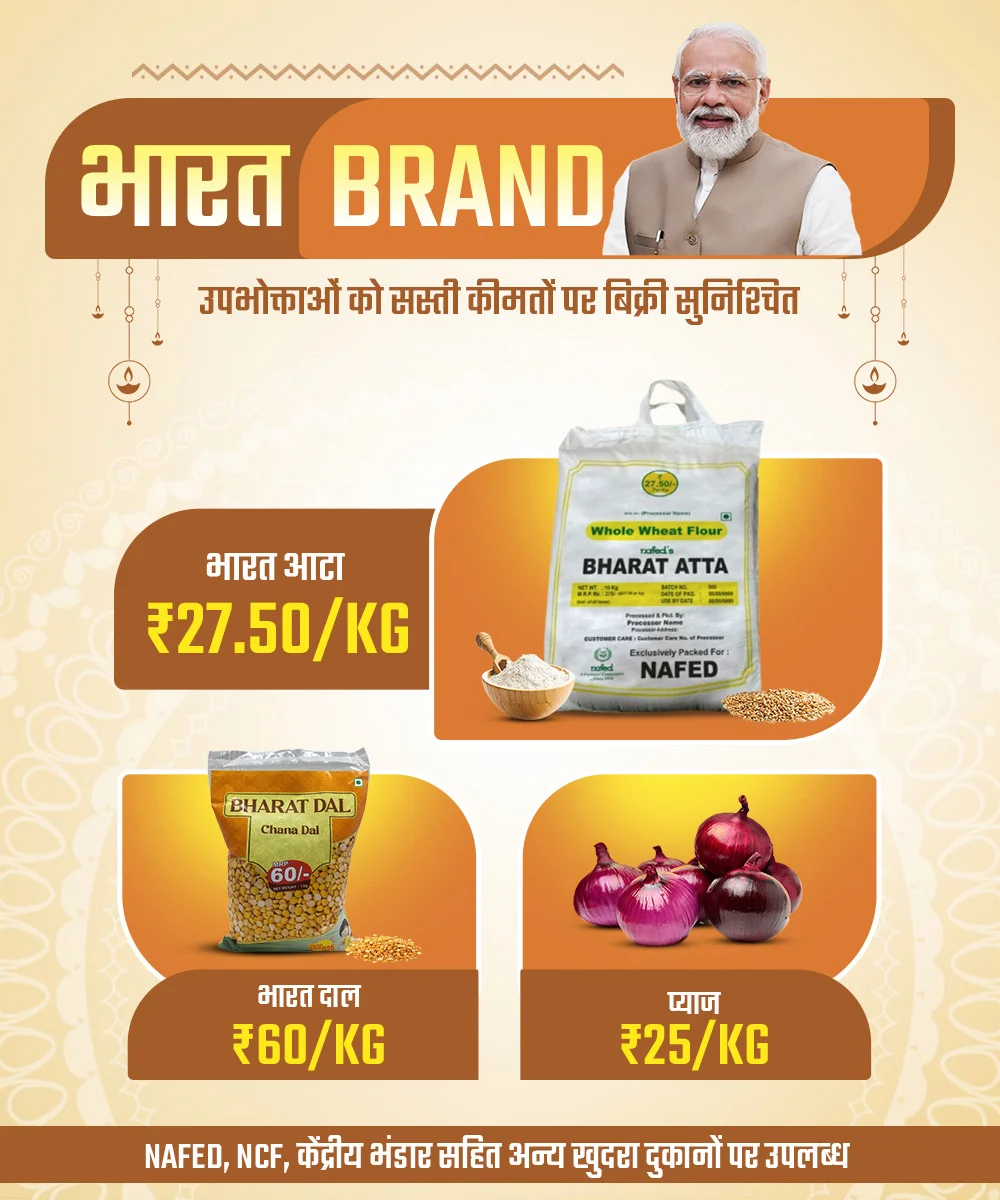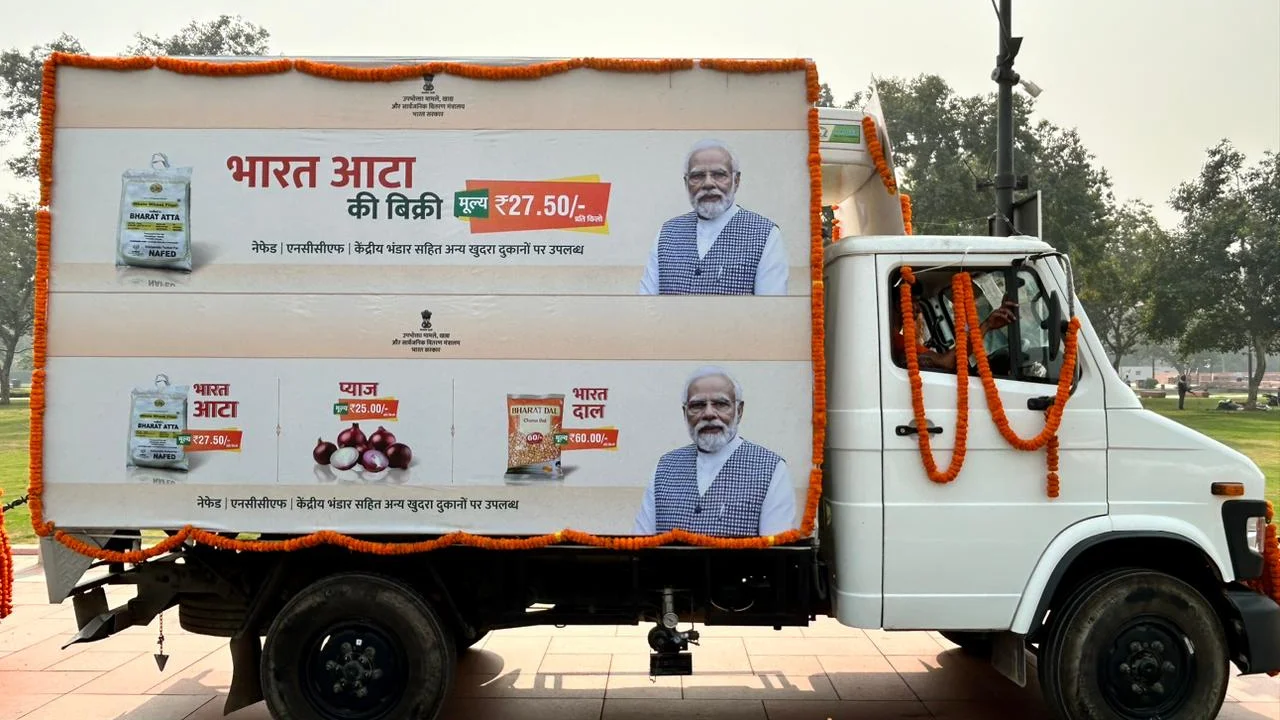Bharat Atta Online

Today, Shri Piyush Goyal, the Union Minister for Consumer Affairs, Food and Public Distribution, Textiles, and Commerce and Industry, initiated a significant initiative by flagging off 100 mobile vans for the sale of wheat flour (Atta) under the ‘Bharat’ brand from Kartavya Path, New Delhi. This Atta will be available at a maximum retail price (MRP) not exceeding ₹27.50 per kilogram.
This step is the most recent in a series of measures undertaken by the Government of India to benefit ordinary consumers. The introduction of retail sales of the ‘Bharat’ brand Atta will enhance the availability of this essential food item in the market at affordable rates, contributing to the ongoing stabilization of its prices.
Bharat Brand Atta
The ‘Bharat’ Atta will be readily available at all physical and mobile outlets of Kendriya Bhandar, NAFED, and NCCF starting today, and it will subsequently be extended to other cooperative and retail stores.
A total of 2.5 Lakh Metric Tons (LMT) of wheat, procured at the rate of ₹21.50 per kilogram, has been allocated for Semi-Government and cooperative organizations, including Kendriya Bhandar, NCCF, and NAFED, as part of the Open Market Sale Scheme (OMSS-D). This wheat will be used to produce Atta and offered for sale to the public under the ‘Bharat Atta’ brand, with a maximum retail price (MRP) not exceeding ₹27.50 per kilogram.
During the event, Shri Goyal highlighted the government’s role in stabilizing the prices of essential commodities. He mentioned that various measures had been taken in the past to manage the prices of items like tomatoes and onions. Additionally, the government is providing ‘Bharat Dal’ at the rate of ₹60 per kilogram through Kendriya Bhandar, NAFED, and NCCF to alleviate the burden on consumers.
About the NAFED
The National Agricultural Cooperative Marketing Federation of India Ltd. (NAFED) is an apex organization of marketing cooperatives for agricultural produce in India. It was established on October 2, 1958, under the Multi-State Cooperative Societies Act. NAFED was set up to promote cooperative marketing of agricultural produce to benefit the farmers.
Main Functions
- Procurement and marketing of agricultural produce, including food grains, oilseeds, pulses, spices, and fruits and vegetables.
- Export and import of agricultural produce.
- Providing financial assistance to cooperative marketing societies.
- Undertaking price support operations for agricultural produce.
- Providing warehousing and transportation facilities for agricultural produce.
- Promoting grading and standardization of agricultural produce.
- Undertaking research and development activities related to agricultural marketing.
NAFED plays an important role in the agricultural marketing system in India. It helps to ensure that farmers get a fair price for their produce and that consumers have access to quality food products at affordable prices.
Benefits of NAFED to Farmers
- NAFED provides farmers with a guaranteed market for their produce at a minimum support price.
- NAFED helps farmers to get a better price for their produce by aggregating it and selling it in bulk.
- NAFED provides farmers with access to financial assistance, such as loans and advances, to help them with their production and marketing costs.
- NAFED provides farmers with access to warehousing and transportation facilities to help them store and transport their produce safely.
- NAFED helps farmers to get better access to markets by providing them with information on market prices and trends.
NAFED is a vital institution in the Indian agricultural sector. It plays an important role in protecting the interests of farmers and in ensuring the smooth functioning of the agricultural marketing system.
- 27 April 2024 Current Affairs in English
- World Veterinary Day 2024 (27th April), Its History & Significance
- International Girls in ICT Day 2024, Its History & Significance
- World Day for Safety and Health at Work 2024, Its History & Significance
- International Labour Day 2024 (1st May), Theme & History
- Happy Mother’s Day 2024 (12th May), Theme, History, Significance

Oliveboard Live Courses & Mock Test Series







